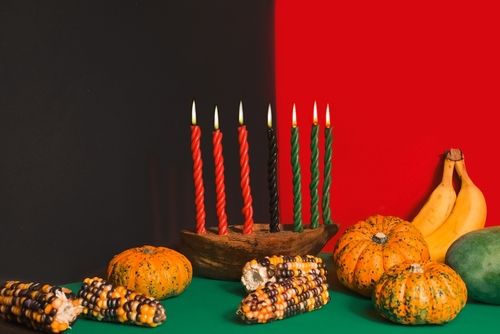
Embracing the Essence of Kwanzaa: A Celebration of Culture and Unity
What is Kwanzaa?
Kwanzaa is a week-long celebration honoring African heritage and culture, observed from December 26th to January 1st. According to the founder, Dr. Maulana Karenga, Kwanzaa is a result of creative cultural synthesis—a system inspired by various elements from different African peoples cultural values and practices across the continent. Rooted in cultural authenticity, Kwanzaa fosters a commitment to tradition and reason, advocating that our thoughts and actions should be based on these principles. For those with ties to African lineage, Kwanzaa is not merely just a celebration but a way of life, providing cultural authority and authenticity to thoughts and deeds.
The continental African roots of Kwanzaa are built upon pillars that have played a foundational role in shaping civilizations, kingdoms, and societies. The first pillar traces Kwanzaa’s origin in Africa, stemming from agricultural celebrations known as the first fruits. The name “Kwanzaa” itself is derived from the Swahili phrase “matunda ya lewanza.” Matunda means fruits and ya Kwanza means first giving birth to first fruit celebration. Across African history, first fruits celebrations have been documented in ancient Egypt and Nubia, within modern civilizations such as Ashantiland and Yorubaland. Additionally Zulu empire, and Swaziland kingdom first fruit celebrations.
The second pillar is the ingathering of the people—a unifying experience that emphasizes community and culture. This gathering symbolizes the harvest of the people, bringing together the most valuable fruits of its name. It promotes collective work and responsibility. The third pillar emphasizes Reverence for the Creator and Creation. It is the expression of African spirituality and the acknowledgment of a life well-lived, praying for others, and just rule of the king. During the celebration the Ashanti King would recite these words “The edges of the year have met. I pray for life of the people. May the nation prosper. May the children be many. May food come forth in abundance. May no illness come. May the people grow to become old men and women. And may no misfortune fall on the land. The fourth pillar centers on commemorating the past and paying homage to ancestors. We honor ancestors as a source and symbol of lineage, for their models of ethical life, service and social achievement to the community, and we honor ancestors for they are the spiritual intercessors between us and the creator. Interestingly enough the Yoruba teach that one is not simply an ancestor by dying, but by deeds. In paying homage to the ancestors is recognition of the long life they lived in service, being righteous and providing a model for generations coming.
Dr. Karenga emphasizes recommitment to cultural ideals as the fifth pillar, involving reaffirmation and rededication to cooperation, peace, truth, justice, righteousness, sisterhood, brotherhood, harmony, reciprocity, mutual care and confidence, cultural integrity, and the seven principles of Kwanzaa. This recommitment requires reflection on where we’ve been, assessing progress, and the understanding that it’s not a one-size-fits-all approach. The Zula and Swazi sought for better leadership within southeastern Africa, so they shared feedback with councils of government. Recommitment to cultural ideals can be instituted on both a personal and collective level enabling moral and social excellence using seven principles of Kwanzaa as the foundation.
The sixth pillar is the celebration of the good. Ingathering of people to praise and rejoice through dialog, stories, dancing, singing, drumming, and feasting. With celebrations like Kwanzaa coming together in unity re-ignites hope in showing the resiliency of the culture.
Kwanzaa serves as the glue holding the culture together. Preserving it requires collective efforts, acknowledging a higher power, celebrating the past, committing to cultural values, and recognizing progress. These pillars form the DNA of the culture, providing a roadmap for moving forward. Wishing you a blessed Kwanzaa filled with unity, heritage, and progress.

